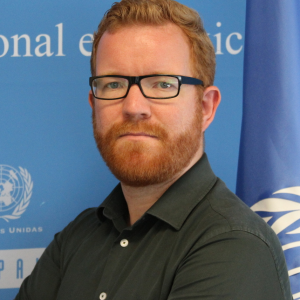United Nations Resident Coordinator pays courtesy call on Pro Vice-Chancellor and Principal of the University of the West Indies Mona Campus on the occasion of the eleventh discussion of the Jamaican Economy Panel
28 April 2022
Jamaica's catastrophe bond adds a vital tool to the arsenal of disaster preparation strategies - additional tactics recommended
On this occassion, Dr. Garry Conille, United Nations Resident Coordinator, met with Professor Dale Webber, Pro Vice-Chancellor and Principal of the University of the West Indies (UWI) Mona Campus.
The two were joined by Professor Ian Boxill, Deputy Principal of UWI Mona, Jonathan Archie, Deputy Campus Registrar, Dr. Nadine McCloud, Head Department of Economics as well as Dr. Olaf J. De Groot, Ciara Patterson & Jomain McKenzie of the UNRCO.
Dr. Conille conveyed the well wishes of the UN System for the strong partnership established between the United Nations in Jamaica and the Department of Economics UWI, Mona.
“Through the Jamaican Economy Panel (JEP), UWI’s technical expertise has contributed to and expanded economic analysis within the UN system and has increased the accessibility of economic discourse within the wider population,” Dr. Conille said.
“The JEP is well aligned with UWI’s strategy and is helping us answer and respond to society’s questions,” Professor Webber said.
The parties exchange ideas into the future of the JEP and explored opportunities for greater strategic engagement between the United Nations and the regional university.
This month's topic directly links with the latest report by the International Panel on Climate Change (IPCC), which warned in early April that the Paris commitment of a maximum temperature increase of 1.5 degrees Celsius is becoming more challenging to achieve. The report also highlights that the climate change impact on Small Island Developing States (SIDS), such as Jamaica, is particularly significant, putting the livelihoods of many people at stake.
When ranking different climate-induced hazards, the panellists see the most significant risk in cyclones (hurricanes), drought, the livelihoods of the coast-dependent population, and the long-run risk of rising sea levels. Other risks identified by the latest IPCC report, such as coral bleaching and biodiversity loss, are considered less urgent in the case of Jamaica.
While mitigation continues to be the gold standard for handling climate change, the latest figures show that it is unlikely that climate change can be addressed entirely in time. For this reason, adaptation should be carefully considered and prioritized as well. When asking the JEP panellists about different adaptation strategies, the need for increased financial resources is particularly apparent. One of the key strategies for Jamaica will be to improve coastal defences, especially with nature-based solutions, such as mangroves, but these would be very costly.
Dr. Nadine McCloud, Head of the Economics Department at UWI Mona and co-founder of the JEP, comments that "major investment is required to prepare the country for climate change. However, while financing opportunities through our international development partners should be pursued, we must explore other ways in which financial flows can be unlocked. The private sector, for example, can extract significant benefits from sustainable and climate-sensitive investment opportunities – an untapped and lucrative pool in Jamaica. The tourism sector, a major recipient of foreign direct investment, stands to lose the most from climate change. So engaging such investors in ensuring that coastlines are protected in the long run would be a logical path to pursue and a win-win for all stakeholders."
For almost a decade (since Sandy in 2012), Jamaica has avoided significant hurricane impacts. This luck could lead to a reduced awareness of the hazards associated with hurricanes and lower vigilance and hurricane preparedness. The respondents generally believe that people are decently prepared but have a somewhat dimmer view of private sector actors.
The JEP panellists applaud the Government's issuance of what is known as a catastrophe bond, which insures the country for up to USD 185 million of hurricane damages. While many panellists believe it is a wise decision to issue such a bond, a substantial number would have liked to see a larger size of such a bond. It was pointed out, for example, that the impact of a hurricane such as Gilbert (1988) would have an estimated impact of up to USD 1.3 billion. While some may view such an enormous catastrophe as very unlikely, its impact would be huge.
Several other respondents also highlighted the need for a broader range of instruments, such as weather derivatives and a more holistic, multisectoral and structural approach to making the country less prone to the impacts of hazards. One respondent pointed out that rigid enforcement of building codes would help lessen the impacts of a cyclone, but that the large construction boom over the past few years may have lessened the attention to such enforcement.
Responding to the survey results, Dr. Conille shared that "the continuing exhaust of greenhouse gases exacerbates existing hazards. While it is crucial to reduce emissions as soon as possible, it is also important to look at ways to alleviate the impacts of disasters that may be exacerbated by continued climate change. SIDS have a great need for additional funds to be able to invest in both mitigation and adaptation. The work of The Hon. Prime Minister Holness with the Prime Minister Trudeau of Canada as co-chairs of Group of Friends of SDG Financing is crucial in the pursuit of such innovative financing accessible to all states."
The Jamaican Economy Panel is a partnership between the United Nations Resident Coordinator's Office (UNRCO) and the Department of Economics at The University of the West Indies (UWI) Mona. The JEP brings together a select group of economic and public sector experts to address monthly socio-economic questions. These questions help to highlight relevant economic issues and the collective expertise of the panellists.
The full results of this month's discussion are available here.

Dr. Nadine McCloud






